Some industries seem to be designed for networking. Conferences and trade shows may be a regular part of the annual calendar, or perhaps the industry is highly collaborative across companies.
The kitchen, though, is a small, insular place where cooks and chefs see the same faces day in and day out. How are chefs supposed to make professional connections from behind the line?
It takes a little work, but it can be done. Here are five networking tips for chefs, to help them build their networks and support systems for both guidance and friendship in the culinary community.
1. Get Comfortable Talking to Strangers
You’ve practiced mincing, dicing, and balancing flavors. Now it’s time to practice talking!
Talking to strangers is a skill like any other, and it’s not one that comes naturally to everyone. It requires engaging in small talk without boring your partner. And you have to listen as well as you speak.
You don’t want to “practice” on the Michelin-starred chef that you’ve been dying to meet! Instead, look for low-stakes practice opportunities like the grocery store, restaurant, or coffee shop. Strike up a conversation with a stranger to get more comfortable talking to new people.
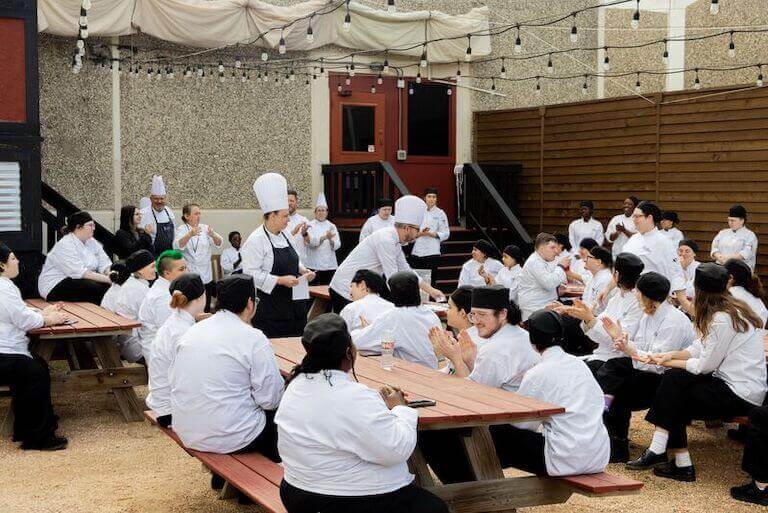
Smalltalk is a skill that can lead to valuable connections!
You can also get experience by getting out of the kitchen at your own restaurant. Can you spend a few minutes circulating the dining room and asking guests how their meal was? This is often a task for the executive chef, but they may let you try if you haven’t reached that level yet.
You could even set up practice chat sessions with other chefs who are looking to improve their communication skills.
“The more you put yourself in uncomfortable situations, or new situations, the better you get at being in those uncomfortable situations. And then being uncomfortable kind of loses its meaning and your confidence builds. You realize that you can do anything. I think that’s an important lesson.”*
Emily Maddy, Escoffier Chef Instructor
When you do get face time with more experienced chefs, it can help to have an “elevator pitch” prepared. What will you say when asked what you do? You could just say, “I’m a chef at X restaurant,” and leave it at that. Or you could say, “Right now, I cook at X restaurant. But I’ve been studying French cuisine, and I’m hoping to get into fine dining.”
This approach is both a conversation starter and informs your partner of your goals naturally. You never know if the person you’re talking to has the connection you need unless you steer the conversation there.
2. Volunteer in Your Community
Nearly all fundraisers and community events have a food component, and they often rely on chefs to volunteer their time. This can be a great way to connect and network with other chefs in your area, including local food celebrities that could otherwise be hard to access. Strike up a conversation and exchange email addresses or social media handles!
At Auguste Escoffier School of Culinary Arts, students are encouraged to volunteer whenever possible. Both the Austin and Boulder campuses have ample opportunities for students to get involved. These events let students connect with professional chefs and provide valuable real-world cooking experience.
In Austin, students have worked at events like Luck Reunion, a festival on Willie Nelson’s farm, and You Grill Girl, a female-focused food event hosted by Les Dames d’Escoffier Austin.
You never know who you may meet at a volunteer event! Escoffier graduate Katie Sualog volunteered at the Austin Food & Wine Festival in November 2021, which gave her the chance to meet famous BBQ pitmaster, Rodney Scott.

Get involved in food festivals like Escoffier graduate Chris Marhevka!
Austin students are encouraged to track their volunteer hours through the Ambassador Program. It incentivizes students to get involved with awards and prizes for meeting certain hour goals. At 60 volunteer hours, Chef Robyn McArthur takes the students out for a fine dining dinner!
Boulder students also get the chance to volunteer, both at Escoffier and out in the community. Students can help with on-campus events like New Student Orientations, or help Chef Instructors with Home Cook Classes. They can also participate in citywide events like the popular Boulder Film Festival.
3. Join Culinary Associations
Getting involved in local, national, and international culinary associations can lead to introductions to chefs from all over the world.
The American Culinary Federation, for example, is a large organization of professional chefs that hosts events for education and connection. This group has statewide and local chapters, so you can connect with other cooks in your area.
Some other groups share a namesake with Auguste Escoffier School of Culinary Arts, like Les Dames d’Escoffier International and Disciples Escoffier International. Les Dames is a culinary organization that promotes women in the food and beverage industries. And the Disciples are devoted to promoting the tradition of French cuisine. Members meet to discuss food and promote charitable causes.
These two groups require sponsorship to join, so try to connect with a current member if you hope to gain admittance.

Take the Culinary Career Survey
We’ve compiled a checklist of all of the essential questions into one handy tool: career options, culinary interest surveys, educational opportunities, and more.
4. Participate in Culinary Competitions
Where else can you meet hard-working cooks and chefs? At culinary competitions! While you may have your sites on the Bocuse d’Or or the Culinary Olympics, you don’t have to go quite so far to rub elbows with other cooks in a little friendly competition.
Escoffier graduate Oscar Beltran competed in a taco al pastor competition during his externship at Moon Palace Resorts in Cancun —and won! And Escoffier graduate Lance McWhorter took home the gold at the Dallas stop of Cochon 555, a nose-to-tail pork event. Even the local chili cookoff could be a great opportunity! These competitions let cooks and chefs practice their skills, build confidence, and develop relationships with other ambitious culinarians. While everyone wants to do their best, many competitions have a collegiate atmosphere that’s more about excelling for yourself than excelling to beat anyone else.
Get more insight into the world of cooking competitions with Philip Tessier, Bocuse d’Or silver medalist, on The Ultimate Dish podcast!
“I think competitions are less about getting your technical skills down and more about meeting people. It’s about networking and meeting people. That’s what it’s about for me.”*
Chef Tracy DeWitt, Escoffier Chef Instructor and Winner of the Food Network Challenge
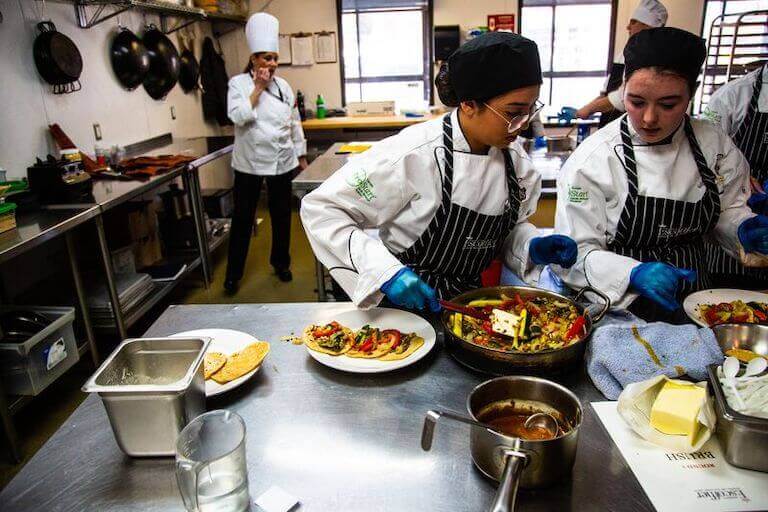
High school students get a head start at the Boulder Young Escoffier Competition.
5. Take Advantage of Social Media
Cooking is an inherently visual process, so there are many chefs that share their day-to-day and culinary creations on social media. These platforms put the chefs you want to connect with within reach. Social media also makes it easy to stay connected to your classmates from culinary school.
If you follow and regularly interact with the content of other local chefs, they’ll start to recognize your name. Post your own content as well to give other chefs an opportunity to see what you can do and engage with you.
While sites like LinkedIn are specifically geared toward professional connections, there is also value in the “lifestyle” platforms. Instagram, with its focus on photography and video, can be a particularly beneficial social site. Escoffier Chef Instructor Steve Konopelski uses his Instagram account to share fun cooking videos as well as lifestyle content. And TikTok is a great place to share short-form cooking videos.
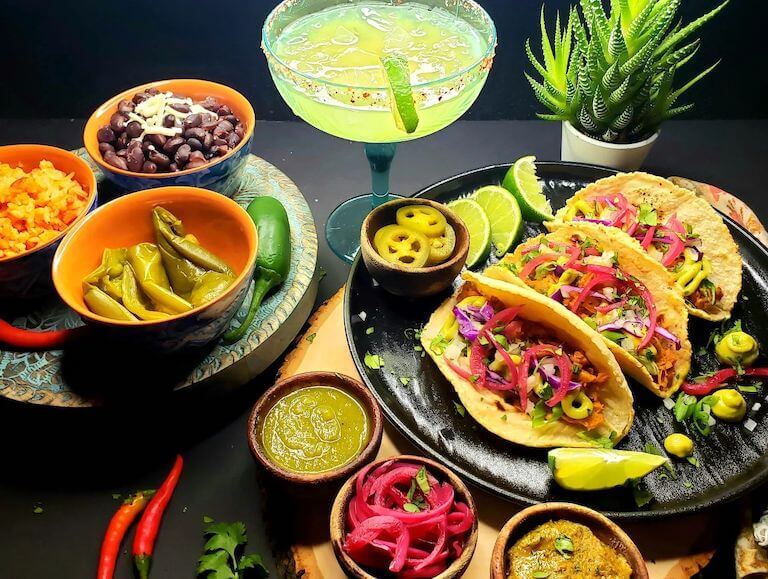
An Instagram post of jackfruit tacos by Plant-Based Culinary Arts student Dianna V.
Social media is all about conversations, so don’t just post and run. You have to actively engage with others online to get any networking benefit out of these apps.
Bonus Tip: Maintain Relationships Over Time
Networking is a long-term process, not something you only do when you’re looking for a new opportunity. Keep up with your culinary school friends as you progress through your career, and stay active in your school’s alumni association.
Escoffier’s Alumni Association has over 7,100 members and gives graduates a place to keep in touch with old friends and meet other former students they may not have encountered at school. It also has job postings and access to continuing education. Plus, members can provide mentorship and advice to younger graduates.
“I have been an active mentor of the [Escoffier] Alumni Association and I’m always willing to participate. Youth are always the next generation of everything that we’re going to do, so it’s important to maintain relationships with them.”*
Chris McAdams, Escoffier Boulder Graduate and Director of R&D, Culinary Culture
Another source of long-term networking and mentorship are the Chef Instructors you meet while studying at Escoffier. Some instructors share their contact information with students, giving them the opportunity to reach out with questions both during and after culinary school.* Continue to cultivate those relationships with your Chef Instructors after graduation day!
Chefs often think of their networks when they’re trying to fill positions for their restaurants, before posting a job opening online. So keeping these relationships warm can keep you in mind for future opportunities. A robust network could also help you to find staff if you’re in a hiring position. It’s a give-and-take!
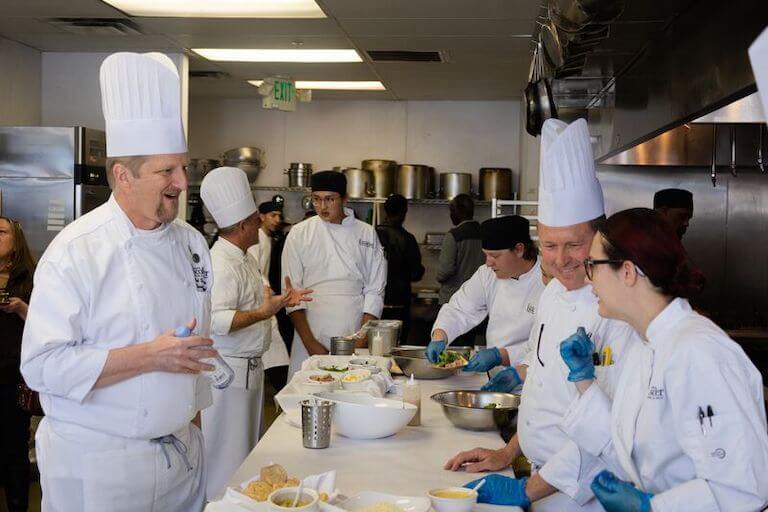
The relationships that students make at culinary school could be a valuable source of mentorship and future opportunities.
Consistency Is Key
Attending culinary school provides nearly unlimited networking possibilities with Chef Instructors, school staff, past graduates, and future graduates all within your reach.
Chefs must be proactive if they’re going to take advantage of these networking opportunities. It may be hard to fit it into your busy schedule, but it’s worth it. The best-known chefs didn’t gain notoriety by hiding in their kitchens all day!
When planning for your future career, consider a culinary school that understands the power of networking. With a robust alumni association, industry events, and a strong team of Chef Instructors, Escoffier is certainly in that camp! Contact our Admissions Department to learn more about degree and diploma programs, and start building a network that could help you succeed!*
For more tips on promoting your career, try these articles next:
- How New Chefs Can Stand Out in the Kitchen
- 5 Effective Ways Chefs Can Communicate with Wait Staff
- 8 Tips for Writing a Chef Resume
This article was originally published on December 15, 2015, and has been updated.
*Information may not reflect every student’s experience. Results and outcomes may be based on several factors, such as geographical region or previous experience.

 “The more you put yourself in uncomfortable situations, or new situations, the better you get at being in those uncomfortable situations. And then being uncomfortable kind of loses its meaning and your confidence builds. You realize that you can do anything. I think that’s an important lesson.”*
“The more you put yourself in uncomfortable situations, or new situations, the better you get at being in those uncomfortable situations. And then being uncomfortable kind of loses its meaning and your confidence builds. You realize that you can do anything. I think that’s an important lesson.”*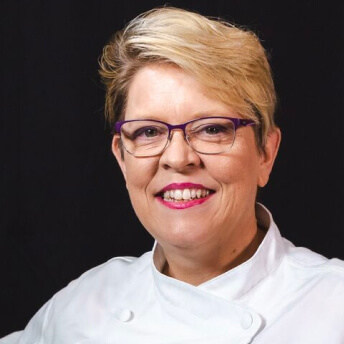 “I think competitions are less about getting your technical skills down and more about meeting people. It’s about networking and meeting people. That’s what it’s about for me.”*
“I think competitions are less about getting your technical skills down and more about meeting people. It’s about networking and meeting people. That’s what it’s about for me.”*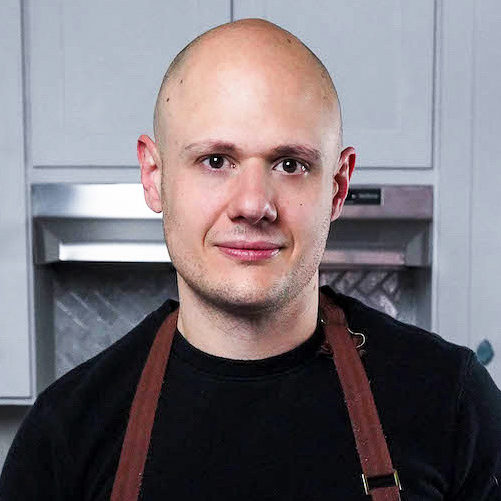 “I have been an active mentor of the [Escoffier] Alumni Association and I’m always willing to participate. Youth are always the next generation of everything that we’re going to do, so it’s important to maintain relationships with them.”*
“I have been an active mentor of the [Escoffier] Alumni Association and I’m always willing to participate. Youth are always the next generation of everything that we’re going to do, so it’s important to maintain relationships with them.”*

